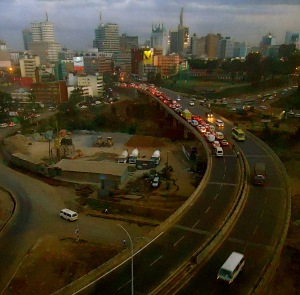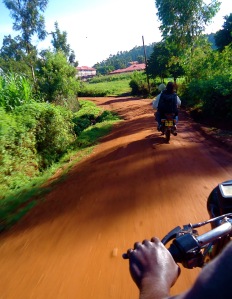Greetings from Nairobi! While I’m officially here for research, what better opportunity to engage with Zidisha on the ground? East Africa is home to countless Zidisha entrepreneurs and a handful of client relationship staff that I’m eager to meet during my two-month stay.
 To convey the climate in which small businesses are operating, I will attempt to convey some of my first impressions. From the capital city’s central business district to packed thoroughfares bordering the Mathare slum, streets teem with commercial activity. Massive foreign direct investment pours into Kenya via multinational firms like Goodyear, General Motors, Toyota, and Coca Cola. But homegrown industry abounds, too. Public busses buzz from stop to stop amid vendors and suit-clad commuters. Flashy smart phone displays adorn Kenyatta Avenue, often alongside high-end retailers and alluring eateries. Cell phone and Internet service centers are ubiquitous, feeding a keen taste for the latest digital gadgets and gizmos.
To convey the climate in which small businesses are operating, I will attempt to convey some of my first impressions. From the capital city’s central business district to packed thoroughfares bordering the Mathare slum, streets teem with commercial activity. Massive foreign direct investment pours into Kenya via multinational firms like Goodyear, General Motors, Toyota, and Coca Cola. But homegrown industry abounds, too. Public busses buzz from stop to stop amid vendors and suit-clad commuters. Flashy smart phone displays adorn Kenyatta Avenue, often alongside high-end retailers and alluring eateries. Cell phone and Internet service centers are ubiquitous, feeding a keen taste for the latest digital gadgets and gizmos.Now, let’s take a ride outside Nairobi—home to nine of ten Kenyans. Beyond the Great Rift Valley and sweeping central highlands lies a bona fide agrarian gem. In Western province, verdant swathes unfold around each bend, unveiling the backbone of Kenya’s key export industries: coffee, tea, and sugar. The East African nation also exports more roses than any other country on earth. Toward Tanzania, cornfields pepper the corridors linking one village to the next. Major routes spanning hundreds kilometers ensure punctual, unabated trans-national delivery of goods to the Indian Ocean and other regional trading partners.
 Community after community brims with welders, carpenters, and shopkeepers. Spectacular craftsmanship is a guarantee at every turn. Bumping down a road tucked into the countryside, I noticed an elderly woman seated on a rock. Before we drove out of sight, a glimpse at her right hand confirmed another conspicuous mainstay of Kenyan society: cell phones. Without a paved road in sight, a portable banking device rested at her fingertips. M-PESA (the same technology that facilitates business transactions for hundreds of Zidisha clients) is Kenya’s mobile money transfer service. M-PESA represents a paradigm shift. It leverages recent advances in telecommunications to lubricate Kenya’s economic machine, so whether you’re in Bongo, Kakamega, Nairobi, or Nakuru, one of Kenya’s 23,000 unmistakable green M-PESA agent booths is never more than a stone’s throw away. Even the most basic phones allow users to transfer, receive, deposit, and withdraw cash from anywhere in the country.
Community after community brims with welders, carpenters, and shopkeepers. Spectacular craftsmanship is a guarantee at every turn. Bumping down a road tucked into the countryside, I noticed an elderly woman seated on a rock. Before we drove out of sight, a glimpse at her right hand confirmed another conspicuous mainstay of Kenyan society: cell phones. Without a paved road in sight, a portable banking device rested at her fingertips. M-PESA (the same technology that facilitates business transactions for hundreds of Zidisha clients) is Kenya’s mobile money transfer service. M-PESA represents a paradigm shift. It leverages recent advances in telecommunications to lubricate Kenya’s economic machine, so whether you’re in Bongo, Kakamega, Nairobi, or Nakuru, one of Kenya’s 23,000 unmistakable green M-PESA agent booths is never more than a stone’s throw away. Even the most basic phones allow users to transfer, receive, deposit, and withdraw cash from anywhere in the country.Plus, successive years of robust economic growth point to a business climate increasingly conducive to job creation. Kenya’s unemployment rate has fallen 10% since over ten years. Last week, the nationally circulated Business Daily honed in on Kenya’s bid to reach middle-income status by 2016.
Cutting-edge digital infrastructure, coupled with promising macroeconomic data, bodes well for Zidisha entrepreneurs like Julius Mburu. It puts control over financial management into the hands of business owners unsatisfied with or unable to access the traditional banking sector. That’s how microcredit empowers. It expands that portion of the population equipped to seize the reins of their own pursuits and in turn, their future. It contributes to a mindset that restores dignity and breeds self-reliance. In the coming weeks, I will undertake to see for myself the human connection that flows through every Zidisha loan.
Until then, try focusing on those aspects of life in which your action makes a difference. To the extent we are able to pinpoint and expand upon these activities, the future looks bright for all of us.


